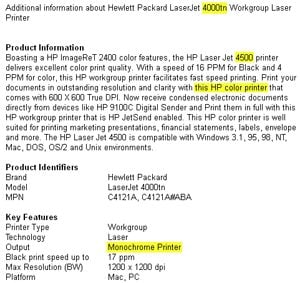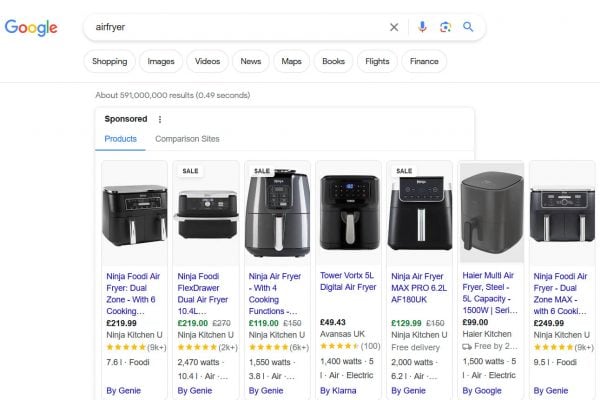From today eBay UK has increased the number of electronics categories in which sellers should list their items with a matching product from the eBay catalogue. Sellers must, where possible, list an item against a matching product from the catalogue, to ensure they avoid having their items removed.
The introduction of catalogues in May 2011 makes searching for specific items easier for buyers and helps sellers to save time when creating and adapting product listings. The main advantages are
- To provide buyers with a positive shopping experience: The eBay catalogue provides buyers with a user friendly way to find specific electronic products both quickly and easily
- Help to maintain and drive sales: Sellers need to ensure they always list an item against a matching product where one exists, to avoid listings being removed. Start preparing today by listing and relisting relevant products to avoid losing out on potential sales
- Save time: Sellers can now save time spent on listing items by taking advantage of the pre-filled product information and stock photos when matching to the eBay catalogue
- Increased visibility: The best deals from Top rated sellers will prominently appear at the top of the product page, with best offers from other sellers showing below
The new categories where sellers should list against the eBay catalogue are: Apple Laptops; Apple Desktops; iPads, Tablets & eReaders; Printers; Routers; Hard Drives; Monitors and Televisions.
This does create some dilemmas though. Firstly what do you do when your item doesn’t match the catalogue information and secondly what do you do if the catalogue information for your item is incomplete or worse the catalogue data is incorrect?
Listing if your item is not in the catalogue
If your item simply isn’t in the catalogue you can select the “Continue listing without a product” link and list the item as you normally would.
Listing if your item is not an exact match with the catalogue
If the catalogue information isn’t an exact match for your item the situation is unclear. I sell printers and often there are several different models available, e.g. an HP 4000 printer, an HP 4000N (with a network card), an HP 4000TN (with a network card and extra paper tray), and an HP 4000DTN (with a network card an extra paper tray and a duplex unit). Suppose I have a 4000DTN but it’s missing it’s duplex unit and the extra tray (which isn’t an unusual situation) – should I list it as a 4000N even though the product code on the printer is DTN, or should I list as a 4000DTN and hope the buyer reads the description to find that some parts are missing? This is a call that each seller will have to make on a case by case basis.
Listing when the catalogue data is incorrect
 The worst situation are the many instances where the catalogue information is simply wrong. For example the eBay Catalogue Information for the HP LaserJet Mono 4000TN printer has the description for an HP LaserJet Colour 4500 Printer! One would have to excuse a buyer who thought that they were purchasing a colour printer if you listed against this catalogue data.
The worst situation are the many instances where the catalogue information is simply wrong. For example the eBay Catalogue Information for the HP LaserJet Mono 4000TN printer has the description for an HP LaserJet Colour 4500 Printer! One would have to excuse a buyer who thought that they were purchasing a colour printer if you listed against this catalogue data.
If the catalogue data is incorrect you have two choices – list without catalogue data and there is a chance your listing could be ended, or list with the incorrect data and call out the errors in your listing description. It is also worth highlighting the errors to eBay support so that they can be corrected.
Should sellers be able to edit catalogue data?
Is it time for eBay to open up the catalogue data to allow users to correct misleading or incorrect information? Would you like the ability to edit catalogue information or to add new entries to the catalogue data? What would happen if you listed against catalogue data which another seller subsequently edited?
How will you handle instances where your product isn’t an exact match or where the catalogue data is incorrect?









13 Responses
I would have thought that eBay would list catalogue data correctly in the first place. At least eBay are trying to have a uniform description for listings by using catalogue data for sellers, but I get the feeling that they are now playing catch up with Amazon and that Amazon is the yard stick that eBay now measures itself by.
What a nightmare for those sellers affected.
Genuinely feel sorry for you guys, fancy having to pay eBay so they can then give buyers incorrect product information, then, let those same buyers mark you on the items description.
Oh dear 😀
I don’t sell electrical items – so this wont affect me … yet. However for what it is worth I do not think it is a good idea for eBay to enforce a catologue system for second hand items. For new stuff yes, probably is a good idea but with second hand stuff there are often imperfections / things plain missing etc and I think the catologue does not give room for this to be made obvious to the buyers.
Oh dear god, can they not leave it alone
https://www.theregister.co.uk/2011/08/23/amazon_cassini_search_rewrite/
beats me why they feel the need to constany
I get the idea of experimenting, although I think my views are clear that it’s the search box that needs fixing, not the category browsing. The news that Cassini is to be tested is great. Let’s hope it takes the buyer experience forward another step.
I also understand that the catalogue will never be perfect — databases always have errors in them. The issue is whether these errors are designed-around and it all “fails nicely” — or whether listings are ended and strikes are issued to sellers who fail to comply. Why enforce the compulsory nature of the catalogue when it’s still this poor?
If it really were better, wouldn’t sellers flock to use it, and those who failed to use it see their sales fall off? So then – let it live or die by it’s merits. If it’s a pain in backside, useless and leads to Bad Buyer Experiences, let us ignore it.
We sell a lot of second-hand items and photograph and describe each and every one of them so that buyers really know that when they open the box the item that they get out is going to be the one that they bought. Even so it’s hard to keep on top of the Item As Described DSR. I can’t imagine what happens if we have to match everything to a catalogue item and rely on buyers looking at a catalogue photo and having to read some words to understand that what they are getting is not the item shown.
None of us want BBEs – I know eBay don’t, and I definitely don’t. Why make something compulsory which encourages them?